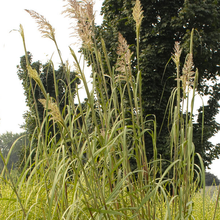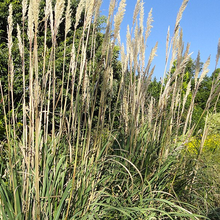Erianthus ravennae is a dramatic tall ornamental grass producing towering feathery silver plumes that sway above narrow blue green foliage. Known for its bold vertical form and late summer to fall flowering, it creates a striking backdrop or focal point in large garden spaces. Drought tolerant once established, it provides four season interest with its persistent plumes and winter structure.
Height & Spread: 96 - 144 in x 36 - 48 in
Bloom Time: Late summer to fall
Light Requirements: Full sun
Soil Preference: Well drained soil; tolerates sandy or clay conditions
Watering Needs: Low to moderate once established
Deer Resistance: Rarely browsed by deer
Native Status
Erianthus ravennae, also known as Ravenna grass or plume grass, is native to the Mediterranean region. It is not native to North America but is commonly cultivated for its ornamental qualities.
WILDLIFE & INSECTS
Birds
- Seed heads provide winter food for finches and sparrows while the tall stalks offer shelter for small birds.
Beneficial Insects
- Clumps provide overwintering habitat for lady beetles and predatory insects.
Pollinators
- While primarily wind pollinated, the plumes may host visiting insects like hoverflies.
Spacing & Landscape Use
Spacing Recommendations:
- Allow 36 - 48 in spacing to accommodate mature clump width and airflow.
Landscape Placement:
- Ideal for back borders, as a tall screen, or as a dramatic specimen plant in large landscapes.
Companion Plants
- Perovskia atriplicifolia (Russian Sage) - Airy lavender blue plumes enhance the vertical drama and attract pollinators.
- Miscanthus sinensis 'Morning Light' - Fine textured variegated foliage echoes the movement and grace of plume grass.
- Rudbeckia fulgida 'Goldsturm' - Bright golden blooms create a vivid color contrast and naturalistic pairing.
- Panicum virgatum 'Shenandoah' - Upright red tinged switchgrass complements the silver plumes of G erianthus.
- Echinacea purpurea 'Magnus' - Purple coneflowers provide mid height texture and color through summer.



